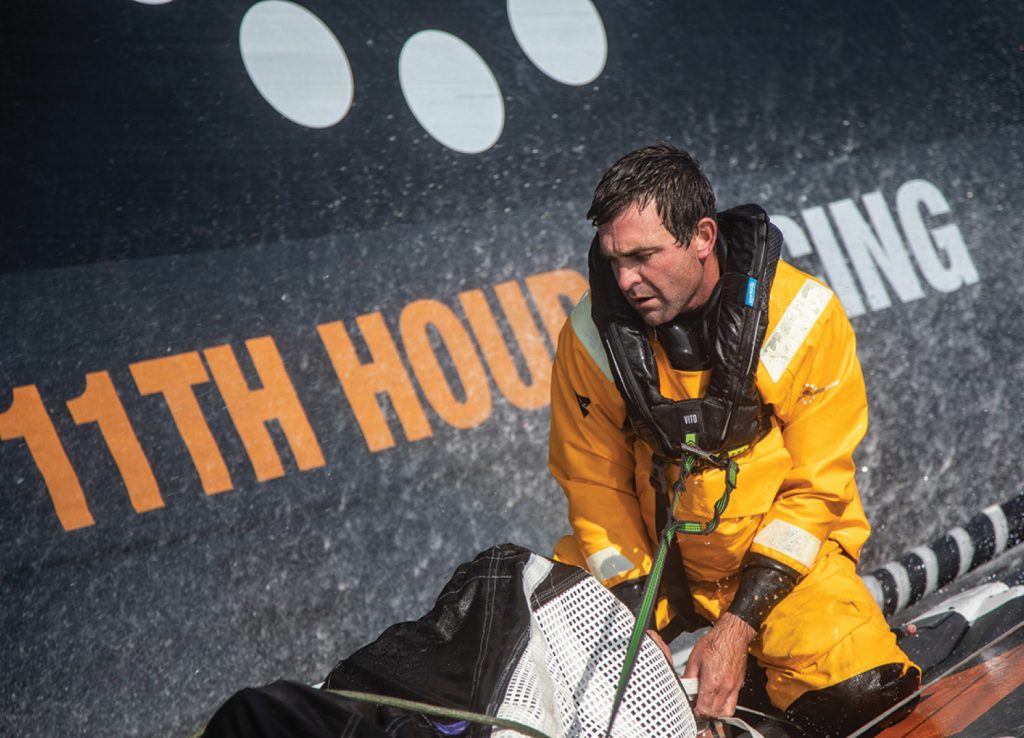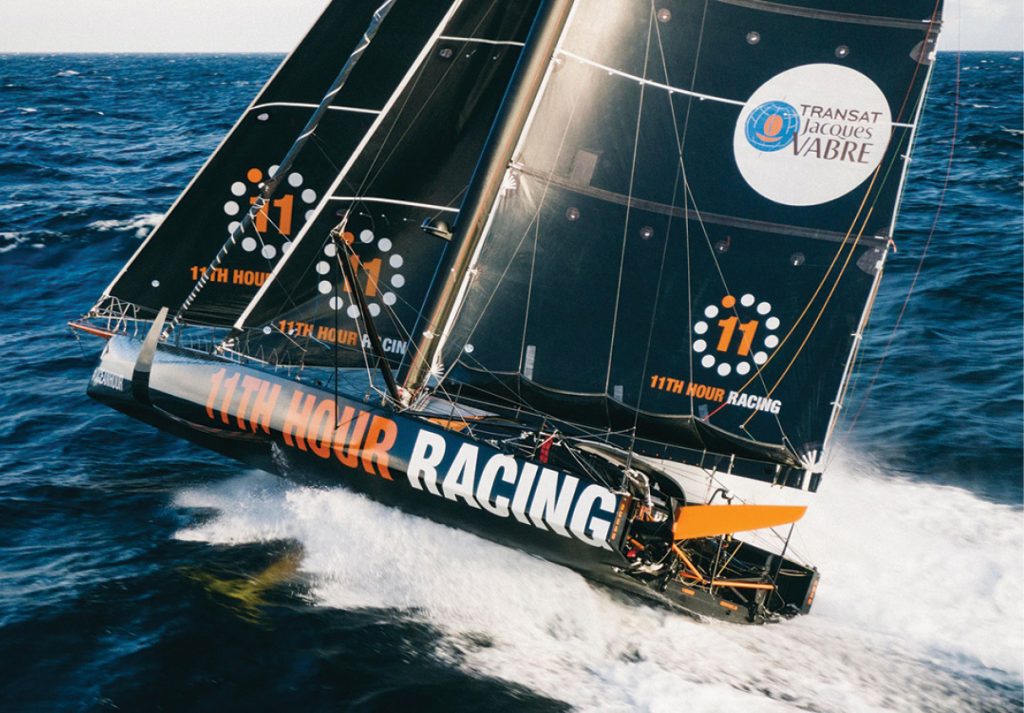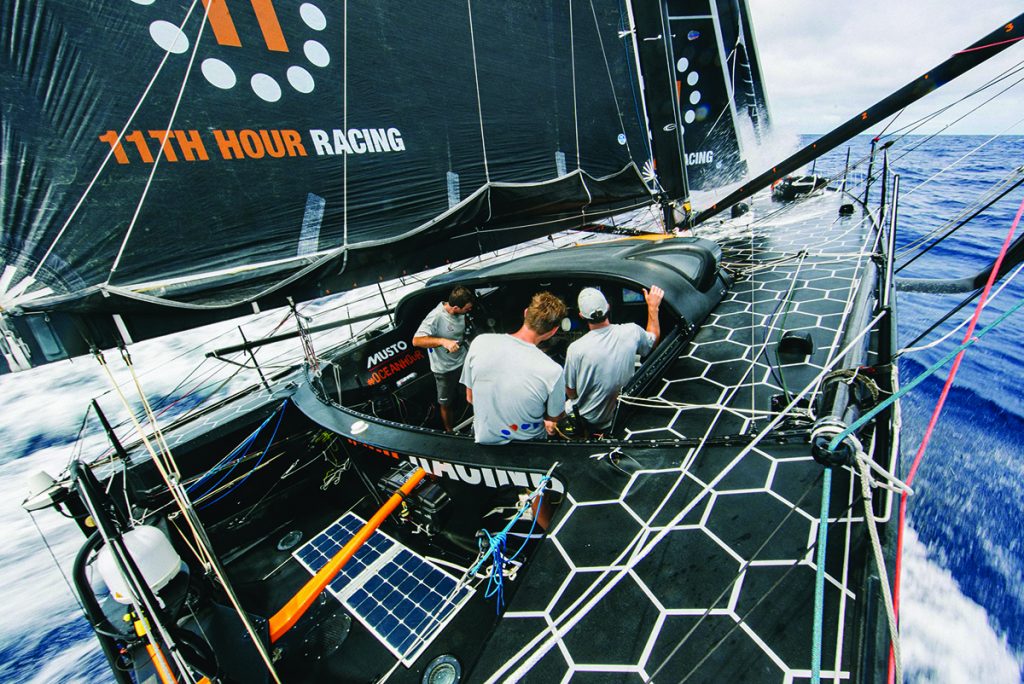As Skipper of 11th Hour Racing Team, Charlie Enright’s goal to lift The Ocean Race Trophy comes with a mission to educate fans along the way on today’s environmental concerns and inspire them to do their part to benefit ocean health and our fragile planet.
Born and raised in Bristol, RI, Charlie, 35, learned to sail at age 5 and was a member of the Brown University Sailing Team. Charlie had his first taste of offshore sailing in 2007 as a crewmember on the TP52 Morning Light for the 44th Transpacific Yacht Race. During that race (documented in the superb Disney film Morning Light), Charlie met 11th Hour Racing Team co-founder and CEO Mark Towill. Together with Mark, Charlie went on to compete in the Volvo Ocean Race 2014-15 with Team Alvimedica and the 2017-18 edition with Vestas 11th Hour Racing, leading both campaigns as Skipper. We recently caught up with one of the busiest people in the sport.

The 2021-2022 edition of The Ocean Race will be Bristol, RI native Charlie Enright’s third ‘round-the-world race. © Matt Knighton/Volvo Ocean Race
WindCheck: Congratulations on your fourth place finish in the Transat Jacques Vabre! What are the most important things you learned while racing doublehanded?
Charlie Enright: It wasn’t so much the doublehanded racing per se, as getting used to the new boat and racing with no crew. It had been a long time since I’ve had to do some of the things I was doing on board last fall on our 11th Hour Racing boat. It was actually a pretty refreshing change during the training in Brittany in the lead-up to the Transat and then during the race itself, and I enjoyed having to do everything on board.
WC: You sailed from Brazil back to France with a full crew, using the voyage to test potential crew for The Ocean Race. Did anyone on that delivery crew stand out?
CE: We haven’t gotten into specifics about our team trials or announcing any of our team members yet, so I can’t say that one person stood out or didn’t stand out. We brought in sailors that we wanted to see how they would fit in with our campaign, how they’d adjust to crewed sailing on the foiling IMOCA, and what unique skills and experience they might bring to the table. That included a female sailor, as well as our on-board reporter Amory Ross, who joined the team last fall and is well known for his offshore visuals, videos and storytelling.
WC: Please describe the differences between racing a Volvo Ocean 65 and a foiling IMOCA 60.
CE: It really is a big, big change between the speeds and the crew set-up being below-deck. You actually get less wet on an IMOCA 60 in terms of how it’s configured. The IMOCA can be incredibly violent…loud, noisy. But so can the VO65, to a somewhat lesser degree. But in the sense that you are pushing the envelope and the boundaries with these boats, that is all very similar and there’s never a moment when you’re letting your guard down unless there’s just absolutely no wind. So while the boats are different, the approach and attitude very much has to be the same. There’s no moment where you are taking your eye off the ball. Both boats are simply that powerful.
WC: Please tell us about your partnerships on the construction of your new IMOCA 60: designer Guillaume Verdier, builder CDK Technologies, and performance partner MerConcept.
CE: There are talented builders, designers and sail racers around the world in this sport, but the key for us in this campaign was surrounding ourselves with IMOCA talent. I like to call it the “IMOCA-culture” and in that sense we think we’ve found some of the best to work with in Verdier, CDK and MerConcept. That’s very much why Mark and I decided to have our training hub out of Brittany, as it’s a French-dominated class. The best way to be close to the talent was to immerse ourselves and gain the know-how and experience we need to be successful in the IMOCA class. These partners help get us there with a fast learning curve.

The speeds and violence of the foiling IMOCA 60s are an order of magnitude beyond those of the VO65s, says Charlie. © Amory Ross/11th Hour Racing Team
WC: What is the role of 11th Hour Racing’s sustainability team during the boat’s construction?
CE: Our sustainability team is led by Volvo Ocean Race 2011-12 winner Damian Foxall. We recognize we’re not going to change construction practices and technology overnight for racing yachts, but the sustainability team’s oversight and monitoring over our boat build is a big part of our campaign. And we hope that we can develop a baseline and suggestions for future IMOCA builds specifically and the yacht construction industry more broadly. We are tracking, auditing and putting processes in place wherever we can to be more sustainable. We have a dedicated sustainability representative in place throughout the boat build process and we had a biocomposites study done to determine what alternative materials could be used. We’re looking to map all of our suppliers and embed circular economic principles wherever we can and analyzing how we can use technology to lessen our build footprint.
WC: When do you expect to launch the boat and commence crew trials for The Ocean Race?
CE: The general timeline for the new boat is over a year from now, but you never know and even the current issues around Coronavirus are already impacting builders based out of Italy, for example. On team announcements, we consider ourselves really lucky to have signed on with 11th Hour Racing as our title sponsor more than two years out from the start of The Ocean Race in 2021-2022. That’s not a luxury we’ve had in the past, and it’s given us a bit more time to speak with and trial crew.
WC: What are the most important attributes you’re looking for in potential crew?
I don’t want to play our cards on that just yet, but we’re looking for fast sailors but also resilient crewmembers that fit in with our team. Resilience is a word that Mark and I use a lot. It’s a long race, there are going to be ups and downs no matter how well you are doing as a team, and it’s one of the biggest things we’ve learned in the first two editions. Be resilient.
WC: Sail Newport and The Ocean Race recently announced that Newport will once again be a stopover. What are your thoughts on that homecoming?
CE: The Ocean Race is a worldwide sporting event, and to host a stopover in Rhode Island is no small undertaking. I’d say it takes a village, but it certainly takes more than that. A successful event takes an active state government that provides the infrastructure to host something like this. It means the City of Newport expanding its tourism season into late spring and the organization of Sail Newport – a small non-profit on Narragansett Bay – taking on the world.
It’s humbling and for me it’s a big point of passion and pride. It’s great to be sailing in and out of Newport, seeing all the spectators, and really having a home-field advantage in an event as international as this is a very special thing.

Crew trials for 11th Hour Racing’s entry in The Ocean Race will commence in the coming months. © Amory Ross/11th Hour Racing Team
WC: Thank you very much, Charlie. The entire WindCheck Community looks forward to welcoming 11th Hour Racing as the first boat into Newport in May 2022…and your subsequent overall victory! ■
Special thanks to Rob Penner at 1 Degree Communications/11th Hour Racing Team for facilitating this interview.




